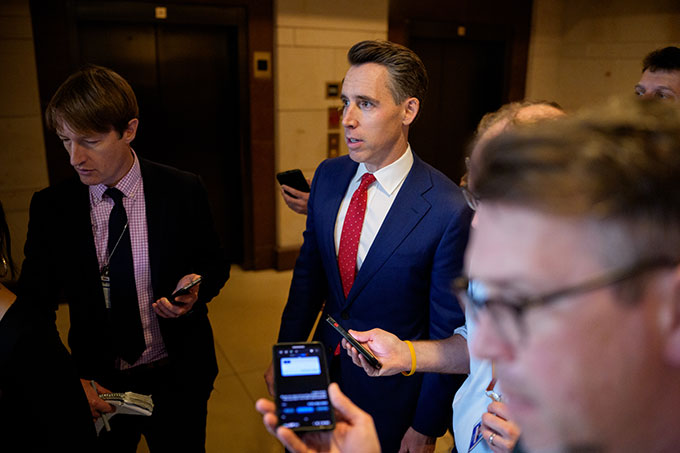The 1.3 million-member International Brotherhood of Teamsters are the closest thing America has to a generic labor union. The Teamsters, who originally represented horse-team drivers, no longer stand for a distinct trade or craft like firefighters or carpenters. Instead, the defining characteristic of a Teamster is that he or she pays Teamsters dues.
It’s a perfect match for a certain contingent of congressional Republicans. Led by Missouri senator Josh Hawley, the Teamsters provide suitable arm-candy for the group trying to rebrand the GOP under “pro-labor conservatism.” They’re focused on coercing more workers into union representation: just 5.9 percent of private-sector workers belonged to a union last year, down from a peak of about 35 percent in the mid-1950s.
Finally, a reason to check your email.
Sign up for our free newsletter today.
This awkward pairing isn’t likely to work out well for GOP politicians or for American workers. In fact, the only thing it may succeed in doing is filling the Teamsters’ coffers and boosting union influence in American politics.
Hawley, who himself has never belonged to a union, has made promoting union membership a main ingredient in his concoction of what Semafor termed “selectively progressive fiscal policies.” Those include more than doubling the federal minimum wage from $7.25 to $15 and banning companies, namely Amazon, from using hourly performance metrics to evaluate warehouse workers.
The Teamsters have been eager partners. After the union abstained from endorsing a candidate in the 2024 presidential race (rather than backing the Democrat), President Trump passed over a bullpen of seasoned management-side lawyers to pick Lori Chavez-DeRemer, a favorite of Teamster president Sean O’Brien, as Labor secretary. Thus far, she has prevented Trump’s Labor Department from rolling back some of Biden’s costliest labor regulations, including 2023 changes to prevailing wage calculations that continue to boost costs on federal infrastructure projects (while filling local unions’ pockets).
As Politico reported last week, the Teamsters are now also sprinkling campaign cash on a few dozen U.S. House and Senate Republicans, including all four downstate New York Republicans.
Where is all of this heading?
The union makes no bones about its desire for sweeping legislation that would remake American labor policy. One of the Teamsters’ top priorities is passing the Protecting the Right to Organize (PRO) Act, which would void right-to-work laws in 25 states and allow unions to force workers to pay them as a condition of employment. It would also change the standard used to decide whether someone is an independent contractor, making it easier for unions like the Teamsters to organize them and start making them pay.
Hawley himself has stopped short of endorsing the PRO Act, but he sponsored one of the key components as a standalone bill. His Faster Labor Contracts Act, which has won him another dose of Teamsters accolades, would let unelected arbitrators write and impose an initial union contract if negotiations stall. Many of these talks involve nonprofit hospitals and health-care systems, not “greedy corporations.” A common sticking point: union demands for compulsory payments from workers (also known as “agency shop”).

Besides pushing the PRO Act, the Teamsters have been crusading against automation and modernization across the economy. It’s a good way to justify taking dues from people but a bad way to ensure their job security. Almost 2 percent of the Teamsters’ nationwide membership was laid off in 2023 when Yellow Trucking went bankrupt and shut down. The company had been trying to fix its inefficient operations, but as Heritage’s Rachel Greszler notes, the Teamsters blocked restructuring efforts, such as having drivers also perform dock work.
Republicans getting on board with these ideas aren’t just awkward—they’re incoherent. There’s little evidence that endorsements from Teamsters executives move the needle in general elections, for parties or for candidates. Can Republicans credibly argue that filling the Teamsters’ coffers (and campaign-donation kitty) will result in the sort of political realignment some hope for, or even a lasting political windfall? The only guaranteed outcome is more power for the Teamsters and other unions over U.S. labor relations.
If these overtures to the Teamsters backfire, Republicans can’t say they weren’t warned. As one GOP politician running for Missouri attorney general tweeted in 2015, after labor-aligned Republicans derailed state right-to-work legislation, “time for an end to union-backed candidates in GOP.”
That pol, Josh Hawley, was on to something.
Top Photo: Jim West/UCG/Universal Images Group via Getty Images
City Journal is a publication of the Manhattan Institute for Policy Research (MI), a leading free-market think tank. Are you interested in supporting the magazine? As a 501(c)(3) nonprofit, donations in support of MI and City Journal are fully tax-deductible as provided by law (EIN #13-2912529).
Source link
















